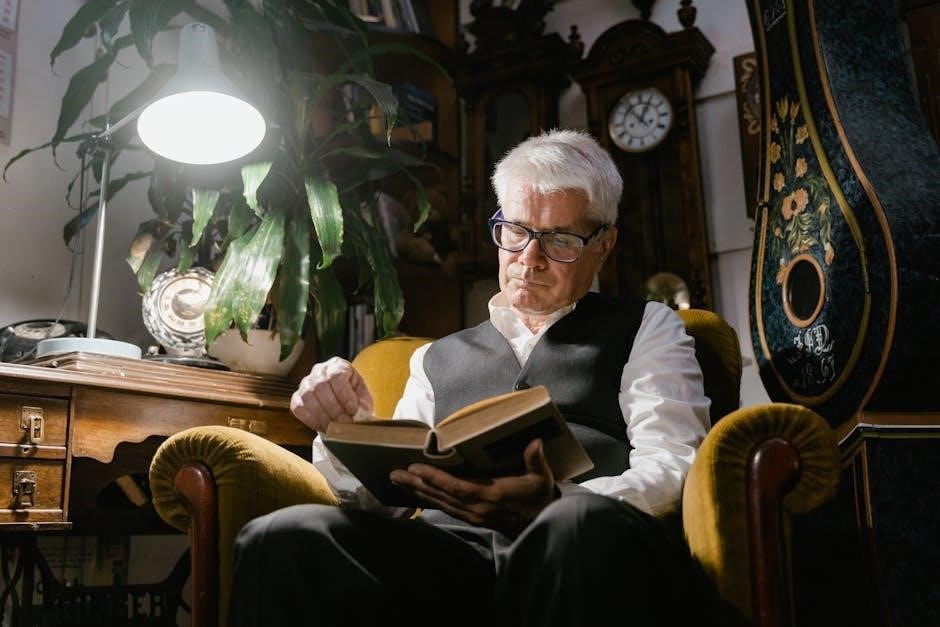This book explores world history through six beverages—beer, wine, spirits, coffee, tea, and Coca-Cola—revealing their profound impact on human development and cultural evolution over centuries.
Overview of the Book
“A History of the World in 6 Glasses” by Tom Standage offers a unique perspective on world history, tracing human development from the Stone Age to the modern era through six signature beverages: beer, wine, spirits, coffee, tea, and Coca-Cola. Each drink represents a distinct period, shaping cultures, economies, and societies in profound ways. The book is divided into sections, each focusing on a specific beverage and its historical significance. From the origins of beer in ancient Mesopotamia to the global influence of Coca-Cola, Standage reveals how these drinks have driven technological innovation, facilitated trade, and mirrored societal values. By weaving together history, science, and culture, the book provides an engaging narrative that connects the dots between seemingly unrelated events, offering a fresh and insightful look at the world’s past. This approach makes history accessible and fascinating for readers of all backgrounds.
The Six Beverages as Historical Markers
The six beverages—beer, wine, spirits, coffee, tea, and Coca-Cola—serve as historical markers, each representing a distinct era and influencing the course of human history. Beer emerged in ancient Mesopotamia, aligning with the rise of agriculture and civilization. Wine became synonymous with classical Greece and Rome, shaping culture and politics. Spirits, born from distillation, fueled exploration and global trade. Coffee sparked the Enlightenment, fostering intellectual revolutions. Tea dominated colonial empires, driving economic and political shifts. Lastly, Coca-Cola symbolized modern globalization, reflecting cultural homogenization. Together, these drinks chronicle humanity’s journey, revealing how societal values, technological advancements, and economic systems have evolved. Each beverage not only quenched thirst but also mirrored the spirit of its time, making them integral to understanding the world’s past and present. Their stories intertwine, creating a rich tapestry of human experience.

The Role of Beer in Ancient Civilizations
Beer played a central role in ancient societies, serving as a sacred drink, a medium of trade, and a cornerstone of daily life and culture.
Origins of Beer
Beer traces its origins to the Stone Age, emerging as a natural byproduct of wild grain fermentation. Early humans discovered that crushed grains exposed to water could ferment, creating an intoxicating yet nutritious drink.
This discovery likely spurred the transition from nomadic to agricultural societies, as cultivating grains became essential for beer production. Beer quickly became integral to rituals, social bonding, and daily sustenance, shaping early civilizations’ cultural and economic foundations.
Beer and the Development of Agriculture
Beer played a pivotal role in the development of agriculture, as its production required a steady supply of grains like barley. Early humans transitioned from nomadic lifestyles to settled agricultural communities to cultivate these crops, fostering technological advancements in farming tools and techniques.
The necessity of beer for nutrition and safety, as it was often safer than water, drove the need for organized farming practices. This shift not only supported larger populations but also facilitated social and religious gatherings, reinforcing agriculture’s importance in sustaining communities.
Archaeological evidence links early agricultural sites to beer production, highlighting its central role in the rise of civilization. Thus, beer was not just a beverage but a catalyst for societal development and technological innovation, deeply intertwined with the origins of organized agriculture.
Beer in Ancient Mesopotamia and Egypt
In ancient Mesopotamia, beer was revered as a gift from the goddess Ninkasi, with recipes inscribed on clay tablets. It served as currency, used to pay workers, and was integral to social and religious life.
In Egypt, beer was a dietary staple, consumed by both the elite and laborers. It was believed to possess medicinal properties and played a central role in religious rituals and offerings to the gods.
Both civilizations developed advanced brewing techniques, with evidence of large-scale production found in ancient texts and archaeological sites. Beer’s significance extended beyond nourishment, acting as a social binder and cultural symbol in these early societies.
Wine and the Rise of Classical Civilizations
Wine became a cultural and economic force, shaping religion, trade, and social dynamics in ancient Greece and Rome, while also fueling intellectual and artistic advancements during symposia and feasts.
The Emergence of Wine in Ancient Greece
Wine emerged as a central element in ancient Greek culture, deeply intertwined with mythology, religion, and daily life. The Greeks attributed the discovery of wine to Dionysus, the god of wine and festivities. Wine production flourished in regions like Attica and Thasos, becoming a significant commodity in trade. The Greeks refined winemaking techniques, such as using clay amphorae for storage and transport, which facilitated its spread throughout the Mediterranean. Wine played a crucial role in symposia, where it fueled philosophical debates, poetry recitals, and musical performances. It also served as a symbol of wealth and status, with high-quality wines being highly sought after. The cultural and economic impact of wine in ancient Greece laid the foundation for its enduring influence in Western civilization, bridging the gap between the sacred and the secular. Wine’s versatility as a drink for both rituals and revelry solidified its importance in Greek society.
Wine’s Role in Roman Culture
Wine played a central role in Roman culture, transcending its use as a beverage to become a symbol of power, religion, and daily life. The Romans adopted winemaking techniques from the Greeks, refining them to create a thriving wine industry. Wine was consumed by people of all social classes, often diluted with water, and was a staple in both private and public gatherings. Roman banquets, or convivia, revolved around wine, fostering social bonding and intellectual discourse. Wine also held religious significance, being used in sacrifices to Roman deities like Bacchus. The Romans expanded viticulture across their empire, establishing vineyards in regions like Gaul and Hispania, which remain prominent wine-producing areas today. Wine’s widespread availability and cultural importance made it a cornerstone of Roman life, influencing trade, medicine, and even social hierarchy. Its legacy endured long after the fall of the empire, shaping the course of Western wine culture.
Wine has long served as a potent symbol of power and status throughout history. In ancient civilizations, access to fine wines was reserved for the elite, with its exclusivity reinforcing social hierarchies. In Greece, symposia were exclusive gatherings where wine was shared among aristocrats, fostering political alliances and intellectual discussions. The Romans further elevated wine’s status, using it as a marker of wealth and influence. Rare vintages and elaborate wine services were displayed at banquets to showcase a host’s prosperity. Similarly, in medieval Europe, the Church controlled significant vineyards, emphasizing wine’s sacred role. This association of wine with power and prestige persisted, shaping its role in global trade and cultural identity. Its status remains evident today, with luxury wines often signifying refinement and opulence. Thus, wine’s historical journey reflects not only its taste but also its enduring connection to authority and sophistication. Spirits played a significant role during the Age of Exploration, serving as currency, medicine, and a tool for trade, while also influencing colonial expansion and global cultural exchanges. Distillation, a process refining liquids, emerged in ancient civilizations like Egypt and Mesopotamia. The Arabs perfected it, creating alcohol through advanced techniques. This innovation revolutionized spirits production, enabling stronger beverages and influencing medicine and trade. Spirits became integral to cultural and economic exchanges during the Age of Exploration, shaping global interactions and colonial expansion. Distillation’s impact extended beyond alcohol, affecting science and industry, showcasing its transformative role in human history. The Columbian Exchange marked a pivotal era in world history, with spirits playing a significant role in shaping global trade and cultural interactions. European distillation techniques, refined over centuries, were introduced to the Americas, leading to the production of rum and other distilled beverages. These spirits became central to the transatlantic trade, often exchanged for enslaved individuals and raw materials. Rum, in particular, emerged as a commodity tied to sugar production, fueling triangular trade routes between Europe, Africa, and the Americas. Spirits also facilitated social and cultural exchanges, influencing both colonizers and indigenous populations. Their impact extended beyond economics, shaping social dynamics and contributing to the complex legacy of colonialism. Spirits, as a product of distillation, became a symbol of both connection and conflict during this transformative period; Spirits played a transformative role in shaping global trade, connecting continents and economies through their production and exchange. Distilled beverages like rum, brandy, and whiskey became valuable commodities, often used as currency or traded for raw materials and enslaved labor. The triangular trade system, for instance, relied heavily on spirits, with rum produced in the Americas being exchanged in Africa for captives who were then forced to work on sugar plantations. This system not only fueled economic growth in Europe and the Americas but also perpetuated the transatlantic slave trade. Spirits also facilitated cultural exchange, as they were introduced to new regions, influencing local drinking habits and social practices. However, their role in global trade was deeply intertwined with exploitation, leaving a complex legacy that shaped both economies and societies worldwide. Spirits, thus, became a potent force in the interconnected history of global commerce and culture. Coffee fueled the Enlightenment by fostering intellectual exchange in coffeehouses, which became hubs for discussing revolutionary ideas that shaped modern science and thought. Coffeehouses emerged in Europe in the 17th century, spreading rapidly from Venice to London, Paris, and Amsterdam. These establishments became vibrant hubs for intellectual debate, fostering the exchange of ideas during the Enlightenment. They attracted scholars, scientists, and philosophers, creating a culture of open discussion that fueled scientific and political revolutions. The shift from alcohol to coffee as a social beverage promoted sobriety and clarity, enhancing the quality of discourse. Coffeehouses also served as spaces for artistic and literary innovation, shaping modern intellectual life. Their influence extended beyond Europe, connecting global trade networks and reflecting the cultural transformations of the time. By providing a platform for collaboration and creativity, coffeehouses played a pivotal role in shaping the Enlightenment and the rise of modern science. Their legacy endures as symbols of intellectual and social progress. Coffee’s arrival in Europe sparked a cultural and intellectual transformation, becoming a driving force behind the Enlightenment. Unlike alcohol, which dulled the mind, coffee promoted clarity and focus, fostering an environment where ideas could flourish. Coffeehouses became hubs for philosophers, scientists, and thinkers, creating a space for open debate and collaboration. Figures like Voltaire and Isaac Newton frequented these establishments, engaging in discussions that shaped modern thought. The shift from alcohol to coffee symbolized a broader societal change, emphasizing reason and innovation. Coffee not only fueled intellectual discourse but also democratized knowledge, making it accessible to a wider audience. This cultural shift laid the groundwork for the scientific and philosophical advancements that defined the 18th century, cementing coffee’s role as a catalyst for intellectual revolution and societal progress. Coffee played a pivotal role in the rise of modern science by fostering collaboration and idea-sharing among scientists and thinkers. Coffeehouses became central gathering places for intellectuals, where discussions about scientific discoveries and theories flourished. The stimulating effects of coffee encouraged alertness and focus, aiding scientists like Isaac Newton and Edmond Halley in their work. These environments promoted a culture of experimentation and debate, laying the groundwork for the scientific revolution. The accessibility of coffeehouses democratized knowledge, allowing individuals from diverse backgrounds to engage with scientific concepts. This cultural shift not only accelerated scientific progress but also established coffee as a symbol of innovation and intellectual curiosity. By connecting scientists and facilitating the exchange of ideas, coffeehouses became incubators for the advancements that shaped modern science. Tea played a central role in shaping global empires, particularly through the British Empire’s dominance in trade and politics, influencing economies, cultures, and colonial policies worldwide for centuries. Tea originated in ancient China over 4,000 years ago, with records showing its use during the Shang Dynasty. Initially consumed for medicinal purposes, it later became a popular beverage, deeply integrated into Chinese culture and rituals. Tea became a cornerstone of British culture and economy, particularly after its introduction in the 17th century. The East India Company dominated the tea trade, importing vast quantities from China to meet growing demand. This lucrative trade not only shaped British customs but also influenced global politics. The British Empire’s expansion was partly driven by securing tea routes and colonies, such as India, where tea production was established to reduce dependence on China. Tea also played a symbolic role in resistance movements, notably the Boston Tea Party, which protested British taxation and contributed to the American Revolution. The tea trade’s impact extended beyond economics, fostering cultural exchanges and shaping the modern world. Its legacy remains evident in the enduring popularity of tea in British society and its historical significance in global trade dynamics. Tea profoundly shaped global politics, particularly during the 18th and 19th centuries. The Boston Tea Party, a protest against British taxation, became a pivotal moment in American history, sparking resistance that led to the American Revolution. In Britain, the tea trade bolstered the East India Company’s power, influencing colonial policies and expanding imperial control. The Opium Wars, driven by Britain’s desire to open Chinese markets to Indian opium and secure tea supplies, reshaped global trade dynamics. Tea also played a role in diplomacy, as its trade routes and monopolies were often used as tools of political leverage. The spread of tea cultivation in colonies like India further solidified British dominance. Thus, tea became not just a commodity but a symbol of power, shaping empires and international relations for centuries. Its impact on global politics remains a testament to its cultural and economic significance. Coca-Cola symbolizes globalization and modern consumer culture, spreading American influence worldwide. Its global appeal reflects the convergence of technology, marketing, and cultural exchange in the contemporary era. Coca-Cola was first concocted in the late 19th century by Atlanta pharmacist John Pemberton. Initially marketed as a medicinal tonic, it contained coca leaves and kola nuts, giving it its distinctive name. The original recipe included caffeine and sugar, which contributed to its refreshing appeal. Pemberton’s bookkeeper, Frank Robinson, is credited with naming the drink and designing its iconic script logo. Initially sold at soda fountains, Coca-Cola gained popularity for its unique taste and medicinal claims. After Asa Griggs Candler bought the brand in 1888, aggressive marketing strategies transformed it into a national brand. By the early 20th century, Coca-Cola had become a symbol of American culture, with its contour bottle design further cementing its identity. The drink’s invention marked the beginning of a global phenomenon that would redefine modern consumer culture. Coca-Cola emerged as a symbol of globalization, spreading American culture and business practices worldwide. By the mid-20th century, it had expanded internationally, adapting to local tastes while maintaining its brand identity. The company’s innovative marketing and distribution strategies enabled it to penetrate diverse markets, from Japan to Germany. Coca-Cola’s global reach not only popularized American soft drinks but also influenced local economies and cultural landscapes. Its ability to adapt—such as introducing localized flavors—further solidified its presence. As a result, Coca-Cola became synonymous with globalization, representing both the unification of consumer preferences and the spread of corporate influence. Its success mirrored the interconnectedness of the modern world, illustrating how a single product could transcend borders and cultures, becoming a universal symbol of modernity and consumerism. Coca-Cola has transcended its role as a beverage to become a cultural phenomenon, symbolizing American consumer culture and globalized tastes. Its iconic bottle design and memorable advertising campaigns, such as “The Pause That Refreshes,” have ingrained it in popular consciousness. The brand has appeared in films, music, and art, becoming a symbol of modernity and globalization. Its “Share a Coke” campaign, featuring personalized bottles, further cemented its connection with consumers. Coca-Cola’s ability to adapt to cultural shifts while maintaining its brand identity has made it a timeless icon. It represents not just a drink but a shared experience, reflecting the interconnectedness of the modern world and the power of branding in shaping culture. As a cultural icon, Coca-Cola continues to inspire and influence, embodying the fusion of tradition and innovation in a globalized society. “A History of the World in 6 Glasses” masterfully weaves the stories of six beverages into a global narrative, revealing how they shaped human culture, trade, and civilization over millennia. The six beverages—beer, wine, spirits, coffee, tea, and Coca-Cola—each played a pivotal role in shaping human history. Beer fueled the rise of agriculture and early civilizations, while wine became a cornerstone of classical cultures, symbolizing power and religion. Spirits drove exploration and global trade, influencing colonial empires. Coffee sparked intellectual revolutions, fostering modern science and democracy. Tea shaped global empires, particularly the British, and Coca-Cola epitomized globalization, becoming a cultural icon. Together, these drinks reflect humanity’s ingenuity, cultural exchange, and the interconnectedness of the world, showcasing how seemingly simple beverages have profoundly impacted societies, economies, and ideas across millennia. Tom Standage’s A History of the World in 6 Glasses has left a lasting impact on historical storytelling, offering a fresh perspective on world history through the lens of six iconic beverages. The book has been widely acclaimed for its unique approach, blending culinary, cultural, and historical insights into a compelling narrative. It has become a popular read in both academic and casual settings, inspiring new ways to understand global development. The book’s ability to connect everyday items to major historical events has made it a favorite among historians and general readers alike. Its success has also influenced similar works that explore the intersection of food, drink, and history. Available in multiple languages, the book remains a testament to the power of storytelling and the enduring fascination with humanity’s shared past.Wine as a Symbol of Power and Status

Spirits and the Age of Exploration
The Invention of Distillation
Spirits in the Columbian Exchange
The Impact of Spirits on Global Trade

Coffee and the Enlightenment
The Spread of Coffeehouses in Europe
Coffee as a Catalyst for Intellectual Revolution
Coffee’s Role in the Rise of Modern Science

Tea and the Shaping of Global Empires
Tea in Ancient China
The Tea Trade and the British Empire
Tea’s Influence on Global Politics

Coca-Cola and the Modern Age
The Invention of Coca-Cola
Coca-Cola’s Role in Globalization
Coca-Cola as a Cultural Icon
Recap of the Six Beverages’ Impact
The Legacy of “A History of the World in 6 Glasses”
